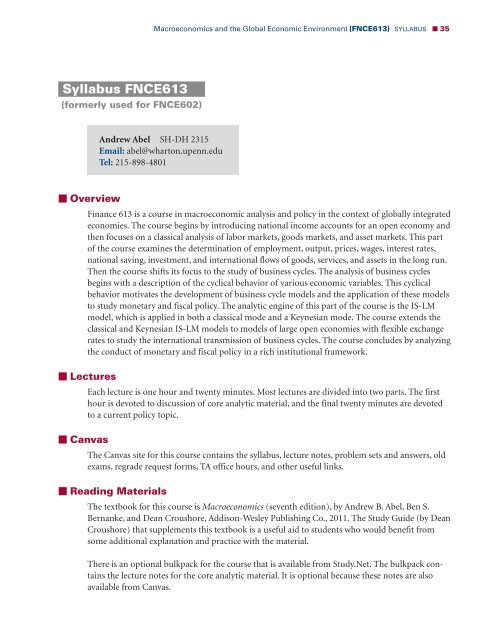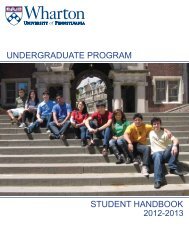Waiver Information Guide - Wharton's SPIKE - University of ...
Waiver Information Guide - Wharton's SPIKE - University of ...
Waiver Information Guide - Wharton's SPIKE - University of ...
You also want an ePaper? Increase the reach of your titles
YUMPU automatically turns print PDFs into web optimized ePapers that Google loves.
Syllabus FNCE613----<br />
(formerly used for FNCE602)<br />
Overview<br />
Macroeconomics and the Global Economic Environment (FNCE613) SYLLABUS 35<br />
Andrew Abel SH-DH 2315<br />
Email: abel@wharton.upenn.edu<br />
Tel: 215-898-4801<br />
Finance 613 is a course in macroeconomic analysis and policy in the context <strong>of</strong> globally integrated<br />
economies. The course begins by introducing national income accounts for an open economy and<br />
then focuses on a classical analysis <strong>of</strong> labor markets, goods markets, and asset markets. This part<br />
<strong>of</strong> the course examines the determination <strong>of</strong> employment, output, prices, wages, interest rates,<br />
national saving, investment, and international flows <strong>of</strong> goods, services, and assets in the long run.<br />
Then the course shifts its focus to the study <strong>of</strong> business cycles. The analysis <strong>of</strong> business cycles<br />
begins with a description <strong>of</strong> the cyclical behavior <strong>of</strong> various economic variables. This cyclical<br />
behavior motivates the development <strong>of</strong> business cycle models and the application <strong>of</strong> these models<br />
to study monetary and fiscal policy. The analytic engine <strong>of</strong> this part <strong>of</strong> the course is the IS-LM<br />
model, which is applied in both a classical mode and a Keynesian mode. The course extends the<br />
classical and Keynesian IS-LM models to models <strong>of</strong> large open economies with flexible exchange<br />
rates to study the international transmission <strong>of</strong> business cycles. The course concludes by analyzing<br />
the conduct <strong>of</strong> monetary and fiscal policy in a rich institutional framework.<br />
Lectures<br />
Each lecture is one hour and twenty minutes. Most lectures are divided into two parts. The first<br />
hour is devoted to discussion <strong>of</strong> core analytic material, and the final twenty minutes are devoted<br />
to a current policy topic.<br />
Canvas<br />
The Canvas site for this course contains the syllabus, lecture notes, problem sets and answers, old<br />
exams, regrade request forms, TA <strong>of</strong>fice hours, and other useful links.<br />
Reading Materials<br />
The textbook for this course is Macroeconomics (seventh edition), by Andrew B. Abel, Ben S.<br />
Bernanke, and Dean Croushore, Addison-Wesley Publishing Co., 2011. The Study <strong>Guide</strong> (by Dean<br />
Croushore) that supplements this textbook is a useful aid to students who would benefit from<br />
some additional explanation and practice with the material.<br />
There is an optional bulkpack for the course that is available from Study.Net. The bulkpack contains<br />
the lecture notes for the core analytic material. It is optional because these notes are also<br />
available from Canvas.




